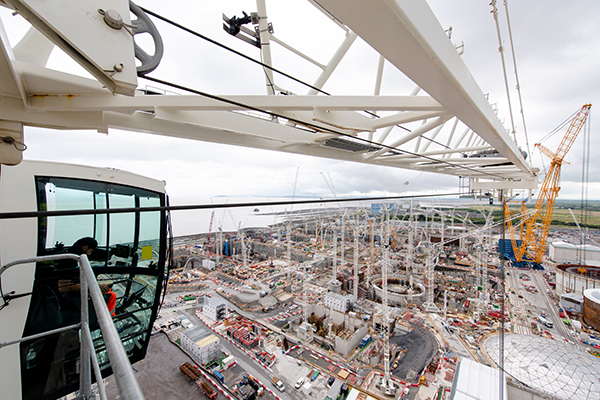In his column for the latest edition of Nuclear AMRC News, CEO Andrew Storer looks at the potential economic benefits to the UK of investment in new nuclear power – and what needs to happen to make them a reality.
This autumn’s energy crisis, coming just weeks before the UN conference on climate change, does seem to have focused some minds on the need to tackle long-standing challenges. When I visited the major party conferences to take part in panel discussions on new nuclear development and the hydrogen economy, I found a renewed appreciation of the need for nuclear as part of the clean electricity mix.
The rocketing costs of gas have shown that we need to improve the security and affordability of our energy. In the UK, we’re also now aiming for total decarbonisation of the power supply by 2035. We need to manage that transition in a way that creates opportunities for UK companies and workers today and for generations to come, and provides wealth across the country.
Investment in new nuclear power can help solve all these challenges, if we move quickly enough to seize the opportunity.
There are ambitious plans being developed for the Sizewell C, Wylfa and Rolls-Royce SMR programmes which can all contribute to our clean energy goals in the early 2030s. If they all go ahead alongside Hinkley Point C, they could make up a total capital investment of some £100 billion in the next decade. Beyond that, there’s the potential of advanced reactors and fusion.
Around half of that investment will be going into the manufacturing supply chain. That means a lot of potential work for the UK supply chain – possibly more than we can manage with today’s capacity.

At Hinkley Point, EDF expects to spend about 64 per cent of construction costs in the UK. For its domestically-designed SMR, Rolls-Royce is aiming for 80 per cent of value to be manufactured in the UK. Across the board, let’s say that about 70 per cent of total investment could go to the UK supply chain, given our current capabilities and capacity.
Any way that we can increase that share will add significant value to the UK economy, with billions going to UK companies, creating long-term jobs, and being spent in our industrial towns and cities.
It’s surely worth investing a few tens of millions in the supply chain to capture that opportunity while securing clean energy for decades to come. We need to provide targeted supply chain support to grow the capability and capacity of the UK’s manufacturers. That was acknowledged in the Nuclear Sector Deal three years ago, but little has really happened yet – although, with the deal now being refreshed, I remain hopeful we will see some movement and investment in the supply chain.
Our Fit For Nuclear programme shows what can be achieved with targeted supply chain support. F4N-granted companies have so far reported that the business improvements they’ve introduced with support from F4N have helped them win over £1.4 billion worth of new contracts in nuclear and other sectors.
But F4N doesn’t go far or deep enough to do everything that needs to be done. It was designed as a first touch for manufacturers looking to enter the nuclear sector or benchmark their capabilities – it’s not about filling gaps in the market, or providing the depth of support that companies need to reach their full potential. That requires more support.
If the UK supply chain can’t meet the requirements of nuclear developers, we will all lose out. For gigawatt-scale power plant, the UK will be buying from overseas developers. The easiest route for them is to rely on their own established suppliers who they can trust to work to familiar codes and standards. It’s simple business sense for them to see a less experienced UK supply chain as presenting a greater risk of delay and overspend.
We need to help our manufacturers build on the experience of Hinkley Point C, grow their capability for Sizewell C, and keep building for other sites and new technologies.
We have the opportunity to put the UK at the front of a growing global market. Every nation in the world faces similar energy challenges of growing demand and the urgent need to decarbonise. We have the opportunity as an industry to take the lead in reducing the cost and maximising the economic benefits of the low-carbon transition, and using nuclear to open up deeper decarbonisation opportunities including more efficient hydrogen generation and synthetic fuel production.
With most of our current nuclear capacity set to retire by 2030, now is the time for significant action to replace the current fleet and grow it to meet our future needs, while creating fantastic careers, business opportunities and export potential. We just need Whitehall to make clear and bold decisions.
 Download our latest newsletter (7MB pdf) for more news and insight from the Nuclear AMRC.
Download our latest newsletter (7MB pdf) for more news and insight from the Nuclear AMRC.- Find out more about why net zero needs nuclear.






